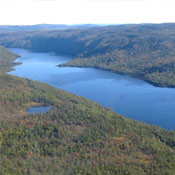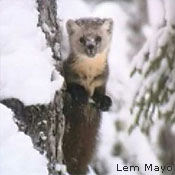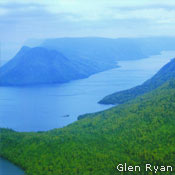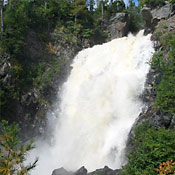Situated in the spectacular rolling terrain of Western Newfoundland, the 729 km2 Little Grand Lake Provisional Ecological Reserve protects extensive bogs and barrens, as well as mature boreal forest that is prime habitat for the endangered Newfoundland marten (COSEWIC, 2000).

- How to get There
- Activities
- Maps
- Services
- Fees and Schedules
- Rules and Regulations
- Permits
- Other Resources
- Contact Information
The reserve’s borders were designed to capture specific ecosystems-making it the province’s first true ecosystem ecological reserve-and also provide the highest level of protection to the marten habitat at its core.
Little Grand Lake Provisional Ecological Reserve is one of three protected areas surrounding Little Grand Lake. The other two are the Little Grand Lake Wildlife Reserve (569 km2) and the Glover Island Public Reserve (178 km2). These reserves extend the area of Newfoundland marten habitat under protection, and provide buffers against the effects of any human activity that would be harmful to the marten’s recovery.
The Little Grand Lake Provisional Ecological Reserve completes the protection of representative portions of three natural regions:
- Western Newfoundland Forest-Corner Brook subregion (928 KB)
- Central Newfoundland Forest-Portage Pond subregion (902 KB)
- Long Range Barrens-Buchans Plateau/Topsails subregion (1.0 MB)
The biologically important ecotone areas where these ecoregions overlap are also included inside the three-reserve system. The area provides habitat for a number of plant and animal species, including woodland caribou that frequent the bogs, ribbed fens, and barrens habitats (in the Buchan’s Plateau-Topsail subregion).

One of only 13 native land mammals inhabiting the Island, the Newfoundland marten is in the same family as the weasel, mink, and ferret. Marten thrive in mature, closed-canopy forest, a habitat type that is disappearing from the Island portion of the province. The total Newfoundland marten population in the province is estimated to be around 300 animals. The forests within the Little Grand Lake reserve system are home to the largest remaining core population of Newfoundland marten on the Island.
The Little Grand Lake Provisional Ecological Reserve was legally established in 2002, after a long history of interest in and concern about the area and its wildlife. The wildlife and public reserves were also created in 2002.
Public consultations on a draft management plan were held in February, 2004. The Wilderness and Ecological Reserves Advisory Council summarized the public comments and provided recommendations to Government in January, 2005. These are currently under review.
Adobe® Acrobat® Reader software can be used for viewing PDF documents. Download Acrobat® Reader for free
How to get there
Newfoundland’s Little Grand Lake Provisional Ecological Reserve lies about 20 km southeast of Corner Brook, 40 km southwest of Buchans, and 30 km south of Deer Lake.
Various woods roads provide vehicle and hiking access; with proper permits, access by snowmobile, boat, helicopter, and floatplane is also allowed.
A series of forest resource roads surround the reserve, namely North Harbour, Lady Slipper, Gull Pond, Pelley’s Brook, Camp 185, Portage Lake, Lloyds River, Star Lake, and the Burgeo Highway (Route 480). These roads provide access points for reserve users but in most cases do not cross the reserve boundary. The Camp 185 network is the only road that provides direct access to the reserve. Currently, major portions of the Camp 185 network are in very poor condition (i.e., multiple washouts and grown-in alder beds) and reserve users are cautioned to use roads at their own risk.
Boaters using the Grand Lake system are advised to take care. The lack of protective coves for shelter, the steep topography of area, and localized deadheads or sunken tree trunks near inshore areas present hazards.
No all-terrain vehicles (ATVs) are allowed in the reserve.
Activities
Scientific research, hunting and fishing, and outfitting are the main activities that take place in the reserve. For more information and research guidelines, see Science and Research.
All-terrain vehicles (ATVs) are not allowed in the reserve, even for game retrieval.
Hunting and fishing are permitted in the reserve, in the appropriate seasons and with valid licences. Trapping and small game snaring is prohibited in the Little Grand Lake Provisional Ecological Reserve.
Snowmobiling, using motorized boats, and landing a plane or helicopter is permitted.
Services
Three outfitters provide guided hunting experiences in the Little Grand Lake Provisional Ecological Reserve: Caribou Valley Outfitters, Moose Valley Outfitters, and Twin Valley Outfitters. For more information, please consult the Government of Newfoundland and Labrador’s Annual Guide to Hunting and Fishing Outfitters.
Fees and Schedule
There are no fees involved in visiting the reserve or obtaining the various permits.
Rules and Regulations
Biodiversity protection and habitat conservation are two of the key purposes of ecological reserves, so certain rules apply within all the reserves in the province.
The public can visit most ecological reserves for educational purposes or low-impact recreational activities, such as wildlife-watching or hiking, including Little Grand Lake Provisional Ecological Reserve.
The following activities are strictly prohibited in all wilderness and ecological reserves:

The public can visit most ecological reserves for educational purposes or low-impact recreational activities, such as hiking or sightseeing. No entry permit is required.
The following activities are prohibited in all wilderness and ecological reserves:
- Disturbing, destroying, or removing plants, animals, or fossils
- Introducing plants, animals, or anything else to the reserve landscape
- Forestry, mining (including exploration), hydro development, agriculture, new roads, tracks, or building construction
- Driving off-road vehicles including all-terrain vehicles (ATVs)
The regulations for the provisional reserve permit the use of snowmobiles and small motorized boats. Currently, snaring is prohibited in the Provisional Ecological Reserve, Wildlife Reserve and Public Reserve.
Read the official reserve regulations:
- Camping, hunting, fishing, and trapping are permitted in the reserve.
Read the official reserve regulations:
- Little Grand Lake Provisional Ecological Reserve Regulations
- Little Grand Lake Provisional Ecological Reserve Order
- Wilderness and Ecological Reserves Act
Regulations and a management plan are pending for the Little Grand Lake Provisional Ecological Reserve.



